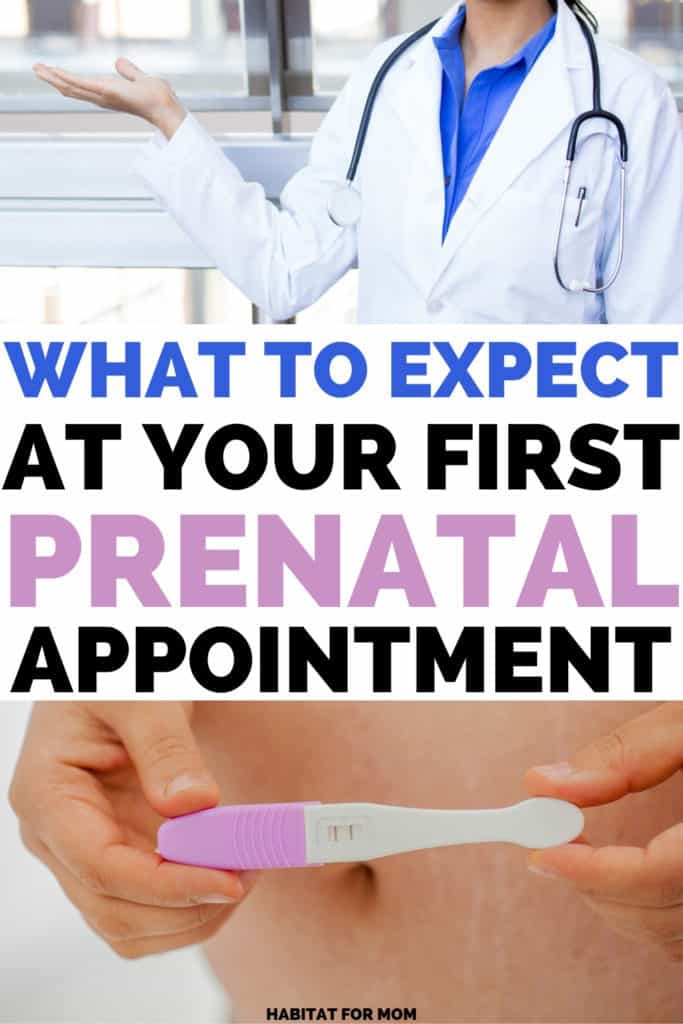This post contains affiliate links.
Your first prenatal appointment is quite comprehensive, and probably the longest during your pregnancy period.
After pregnancy confirmation, your doctor can schedule an appointment with you in your 8th week of pregnancy.
During this visit, your doctor screens you for possible medical conditions and other issues that can impact the baby.
Hello! My name is Jennifer. I am a mom to one handsome awesome autistic little boy, and like you, I was very curious about the whole intake process for my first prenatal apt. Like what do they do anyways?!
Not only was I trying to figure out how to find the perfect Dr. but also I wanted to figure out how to prepare for my baby. Everything was so new and I needed some advice and guidance!
Luckily nowadays there is a plethora of education and guidance on the internet.
Like this pregnancy planner + journal that literally helps you with EVERYTHING UNDER THE SUN!
It even has amazing checklists that help with your first prenatal appointment so you don’t go in it unprepared and anxious.
I got this planner for my pregnant cousin because unfortunately, it wasn’t available when I was pregnant (I wish it was!) – she absolutely loves it, it helps her stay organized and on task through every trimester of pregnancy.
If you need more help with figuring it all out mama, (because we all do) then this pregnancy planner is going to save your life!
That being said, my first prenatal appointment was pretty straight forward.
These are the things you should normally expect during your first prenatal appointment…
Recommended read: Questions you may have when you find out you are pregnant
Ideally, What to expect at your first prenatal appt:
Your doctor will likely check for:
Vital Signs
The medical practitioner uses interpretive signs to evaluate the condition of crucial body functions, including respiratory rate, heart rate, and blood pressure.
Therefore, throughout pregnancy, the doctor monitors these vital signs to determine any change that indicates underlying conditions.
Your doctor will ask the exact date when you had your last menstrual period. It helps them estimate your due date.
Additionally, the doctor may want to know any form of birth control method you have used before and the history of your menstrual cycle.
Reproductive History
In your first prenatal visit, your doctor will also ask about your previous pregnancies, and if you’ve had abortions or miscarriages before.
If you’ve had previous pregnancies, you’ll need to state the following:
- Length of pregnancy
- Delivery method
- Weight of baby at birth
- The anesthesia used during the delivery of any infections, blood pressure problems, or other complication that occurred
The doctor uses all this information to predict the future outcomes of your pregnancy and design a custom medical plan suited for your unique situation.
Gynecologic History
Your doctor must understand your past and current gynecological conditions that can affect your pregnancy.
And this involves informing your doctor if you’ve had any STDs (sexually transmitted diseases). They may include gonorrhea, syphilis, genital warts, trichomonas, etc.
Medical History
While assessing medical history, your doctor takes into account any diseases you’ve suffered from in the past.
Most of these conditions have the potential to compromise your pregnancy and threaten your baby’s health.
These may include lupus, diabetes, high blood pressure, heart, and lung diseases. It’s also crucial to inform your doctor if you’ve ever had a history of:
- Blood transfusion
- Allergic to some drugs
- Trauma
- Mental disorders
- Surgery
Your doctor will place you under close monitoring during pregnancy, in case you’ve ever had these conditions.
Family History and Risk Assessment
Once the doctor completes assessing your medical history, he/she will want to know more about you and your partner’s family history.
Doing this assists the doctor to run a risk assessment of some inherited or genetic conditions.
For instance, a family history of high blood pressure or diabetes increases your chances of developing these conditions during pregnancy.
Physical Examination
The initial prenatal examination is crucial to allow your doctor to analyze the abnormalities and defects that are present in different body parts.
Your doctor may examine your head and neck, lungs, heart, abdomen and breasts, your skin, and the pelvic region.
Finally, at the end of your first prenatal visit, the doctor may provide other requisite information and essential precautions you must take during your pregnancy period.
If you’ve been worried about what to expect at your first prenatal appt., there you have it, everything you needed to know.
If you liked this article please share it with a friend 🙂
Don’t forget to check out the Oh Baby Pregnancy Planner! (It WILL save your life)
Pin for later:


